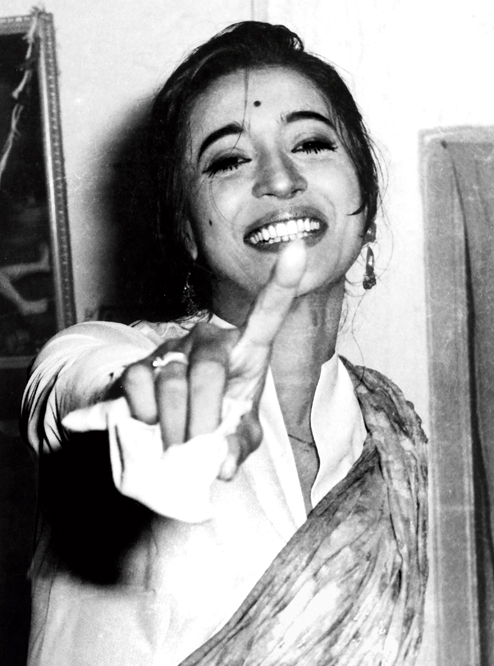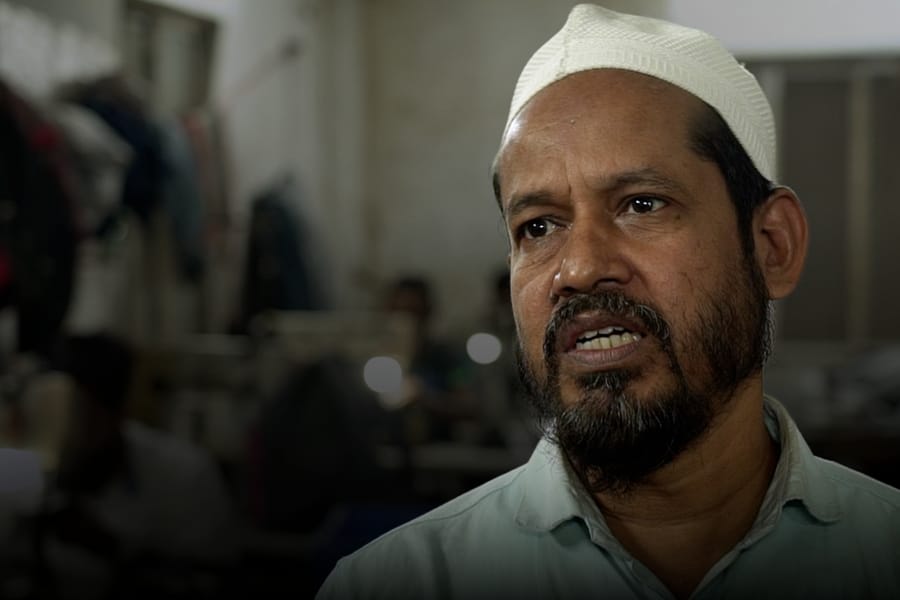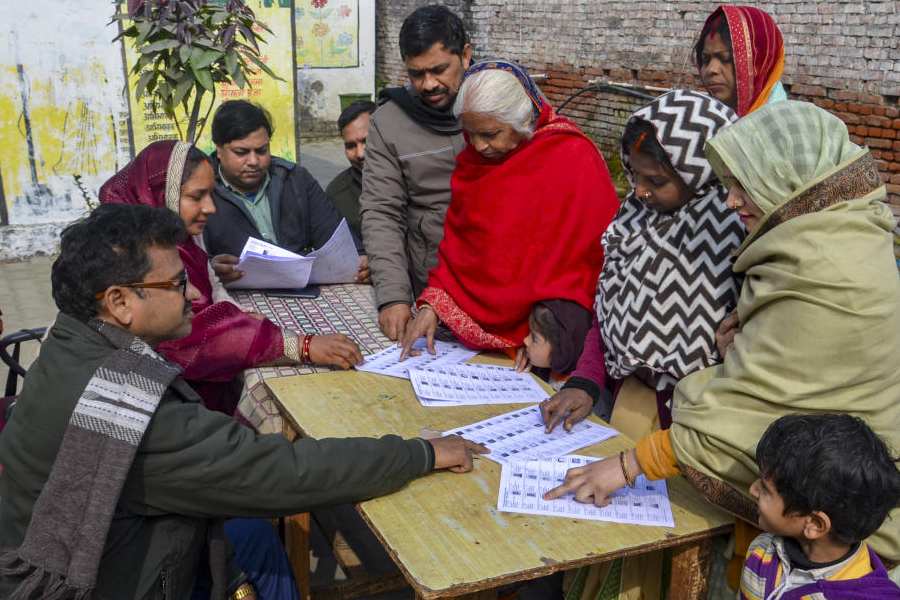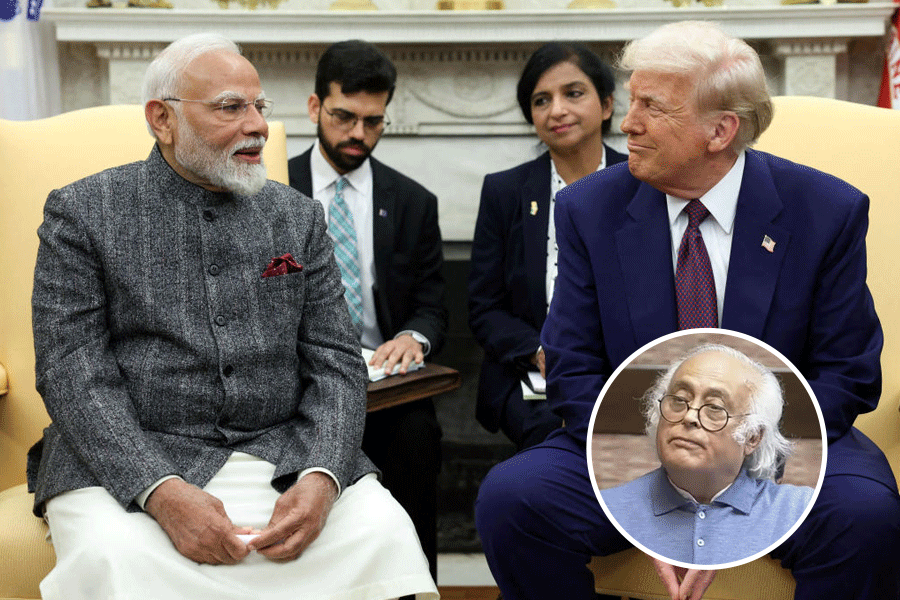 |
There was something about Suchitra Sen.
She was arguably the least skilled actress among the ‘S’ trio of Suchitra-Sabitri-Supriya, and yet she was the biggest star.
She was never the chosen one for Ray or Ritwik, the pride of Bengal, and yet she was the one the Bengali film audience loved the most.
She was the darling of the masses, and yet for over three decades she did not allow anyone to even catch a glimpse of her.
Suchitra Sen, 82, died on Friday.
Born Rama Dasgupta on April 6, 1931, Pabna, Bangladesh, she is survived by a trio of actresses — daughter Moon Moon and granddaughters Raima and Riya.
“She was the most glamorous heroine of her time. The grace, elegance, sophistication and poise she brought to Bengali cinema is missing today,” says granddaughter Raima Sen.
But where does Mrs Sen — that’s what she was called on the floors — figure in the hall of Tollywood fame? Top of the class when it comes to star appeal, middle of the class as far as acting goes, says cold academic assessment.
“I don’t think she scores high marks as an actress, but there is no doubting her star value,” says film scholar Sanjoy Mukhopadhyay.
“She will be remembered for her hairstyle, her lower lip, that look in her eyes… She represented a certain kind of performance.”
That, not even her rival in love (definitely on screen) can doubt. Ask Supriya Devi to rate Suchitra as an actress and she says after a potent pause: “She was an extremely glamorous woman. One of the most glamorous actresses in the film industry. That’s all I can say.”
A tale lies in what she left unsaid, about Suchitra the actress, but no one can ever doubt that Suchitra was the most stunning sight on the Bengali screen.
Fan-turned-film star Prosenjit says: “Suchitra Sen is someone who shows you how a heroine of commercial films needs to carry herself on screen. Even in films that were different from the run-of-the-mill romantic films, she never lost her glamour. That was an intrinsic part of her being.”
Unlike Prosenjit, Ranjit Mallick went from fan to co-star. “I was a huge fan of Uttam-Suchitra during my college days. She was the woman of everyone’s dreams. Her smile, her gaze.... She was not just beautiful, she was very attractive too.”
It was not just A for Attractive. There were definite sparks of Suchitra the Actress, from Deep Jwele Jaai to Uttar Falguni to Aandhi.
“As an actress, I didn’t find any shortcomings in her. She did full justice to her role in Aandhi,” says Gulzar, the film’s maker. “And with all her reservations, she was very friendly and affectionate.”
While her Indira Gandhi act in Aandhi got her national recognition, Rina Brown in Saptapadi, to many, defined the duality of Suchitra. A haughty egoist who people loved to hate but just couldn’t stop gaping at. And then a soft, sacrificing dream woman who won Uttam Kumar’s heart in the film and convinced a thousand other Bengali men that this was the real Suchitra.
The essence of her duality lay in her name. Her entry into films happened within four years of her marrying Dibanath Sen in 1947 (he died in 1969). One fine day, Nitish Roy, secretary to filmmaker Sukumar Dasgupta, told Rama Sen: “From now on you will be known as Suchitra Sen in the film world.”
And that was that. “I am both Rama and Suchitra Sen,” she would admit to a rare confidant decades later, hinting at a deeper duality of being.
But on one count, there was no duality — her stunning looks and striking screen presence.
“She was the most beautiful actress of her time. She was so convincing in each and every role she did. I think she was unbeatable, yes unbeatable is the word for her,” says granddaughter Riya.
Unbeatable in song sequences is how Dharmendra remembers Sen, his co-star in Mamta. “The memories are still fresh even though it was way back in 1965. No one was better than Suchitra when it came to song sequences and I remember how we shot the song sequence in Baharon mein akele in Darjeeling in just one take. I was just a newcomer but never for once did she make me feel that.”
Another newcomer’s nerves she helped ease were Ranjit Mallick’s. “I was a rank newcomer and Suchitra Sen was a star. I was in awe of her on the sets. But Mrs Sen made things very easy. She would be quite friendly. What is still fresh in my memory is her tremendous dedication to work,” recalls Mallick.
Was it the newcomer’s luck for Garam Dharam and Koel’s dad? Some Tollywood veterans who recount close encounters of the uncomfortable kind with the prima donna sure think so.
“She was so haughty and egotistical. She could look through people and make them feel so small,” stabs a veteran actor who worked with Suchitra. “Uttam Kumar was a far bigger star, and a much better actor, but he was so much more approachable and loveable,” adds the actor on strict condition of anonymity.
So, would Suchitra have been Suchitra if there was no Uttam-Suchitra?
Film scholar Mukhopadhyay has no doubt that “without Uttam, Suchitra would not have had her own identity”.
Uttam and Suchitra, according to him, filled a historical space. “In the post-Independence reality, a romantic couple could only exist on screen…. And Uttam-Suchitra, from Sagarika to Saptapadi, occupied that void.”
The power of The Pair in Bengali cinema is best summed up by Supriya Devi, the love of Uttam’s life as a superstar. “Tomader Dada (that’s Uttam Kumar in Supriyaspeak) and Ramadi (that’s Suchitra in Supriya- speak) looked great together. The whole world knows and loves the pair. The Uttam-Suchitra pair was like Sophia Loren-Marcello Mastroianni, like Elizabeth Taylor-Richard Burton.”
Prosenjit, who has watched the Uttam-Suchitra films more closely than most, has two intriguing observations. First, he puts Suchitra a step ahead of Uttam in the trendy stakes. “She was a trendsetter. If you notice their early films, you will find that she carried herself far better than him. After a few years, Uttam jethu caught up with her,” he says.
Second, Prosenjit “loved her performances most in the films she didn’t star alongside Uttam jethu”. His favourites? Uttar Falguni, Deep Jwele Jaai and even Datta.
Having starred as a pretty young thing in Shaare Chuattar (1953) — a fortnight after her low-key debut in Saat Number Kayedi — Suchitra ended her starry screen saga with Pranay Pasha (1978). By then, the lines on her face were beginning to show.
Rather than wither and fade in full public glare, Suchitra decided on a dramatic exit — closing the door on the world that worshipped her. For over three decades, she made sure she escaped the public eye.
Privacy became her enduring obsession. And it grew with every passing year. Even when she was hospitalised, she was paranoid about being seen and photographed.
As the star disappeared from the world outside, there emerged a devout inspired by the teachings of Sri Ramakrishna. She got diksha from Swami Vireshwarananda in the late 1970s and often stole a visit to Belur Math. Sometimes early in the morning, in the evening, or late in the night. Always veiled.
To monks who would visit her at home when she was too frail to travel, Sen said she had found her inner peace in meditation and prayers. “Ami etei shanti pai, Maharaj,” a senior monk quoted her as saying.
“Personally, I rue the fact that she deprived us of a teacher by cutting herself off from us all. We had so much to learn from her,” regrets Prosenjit.
“I don’t think men of my generation have ever fantasised about her; she’s more revered by us. And the fact that she withdrew into her own private world has helped her maintain that aura.... She epitomised romance in the Golden Age of Bengali cinema,” is how actor Parambrata Chattopadhyay sums it up.
Reactions to her reclusion range from the sympathetic to the sneering. “We kept in touch until the time she chose not to be disturbed. I respected her choice,” says Gulzar.
“Her retreat is the final act of her vanity. What can be more egotistical than choosing to be an enigma?” demands a co-star.
“It’s sad if people can’t respect someone else’s privacy,” counters granddaughter Riya. “But no one can take away what my grandmother is and will always be.”
She blazed a trail of stardom and then disappeared behind a veil of secrecy.
She lived a star, and died an enigma.
There was something about Suchitra Sen.











